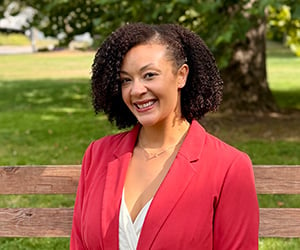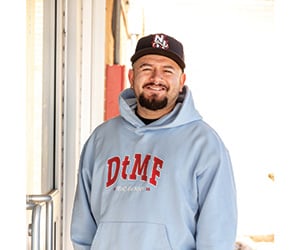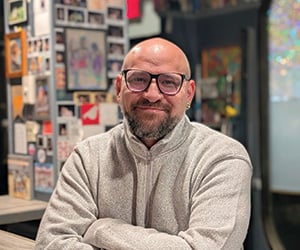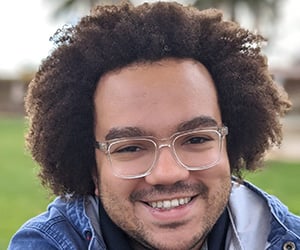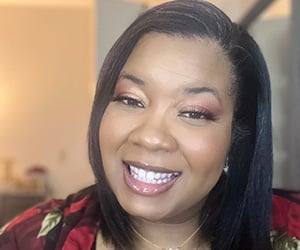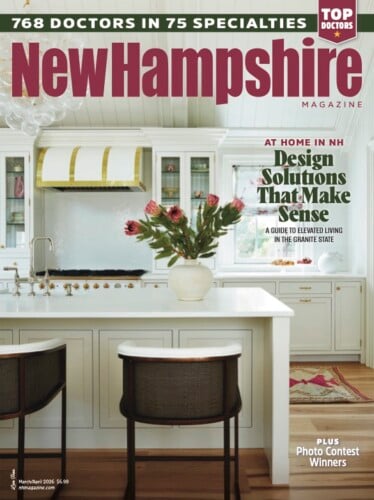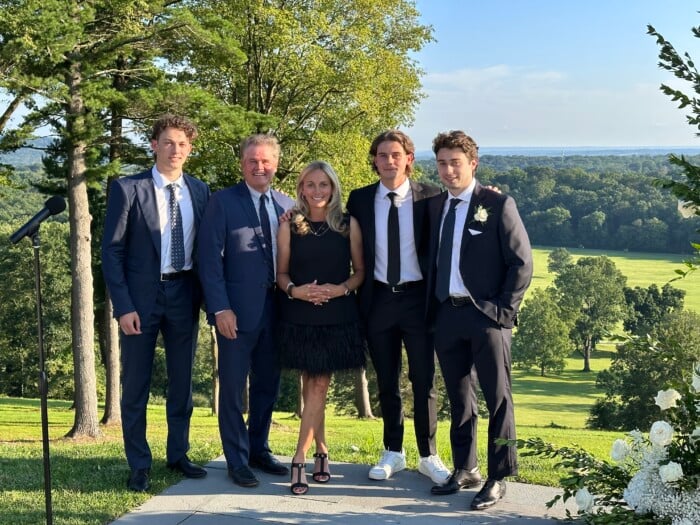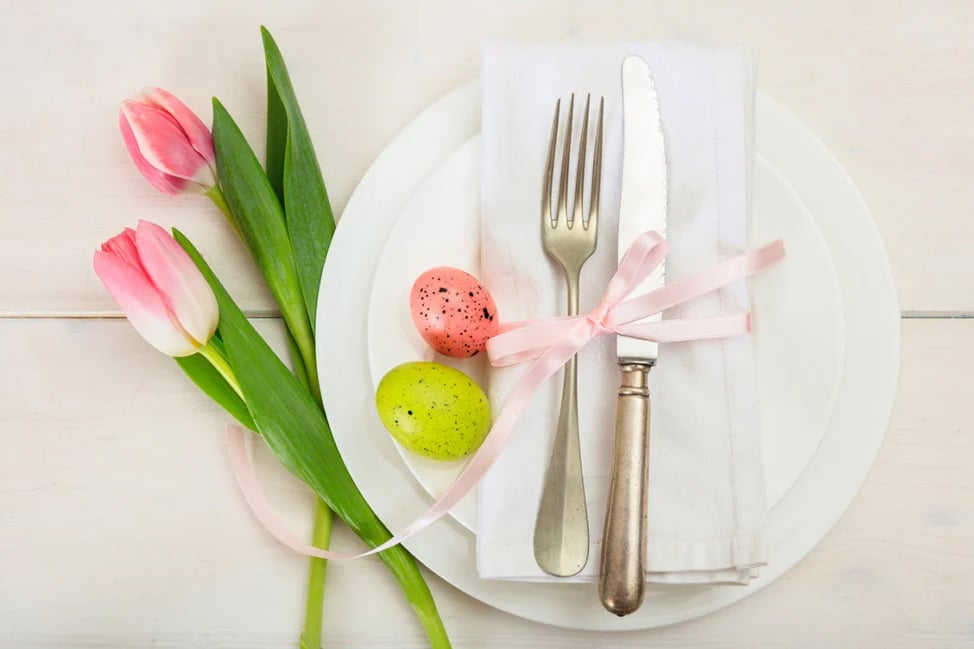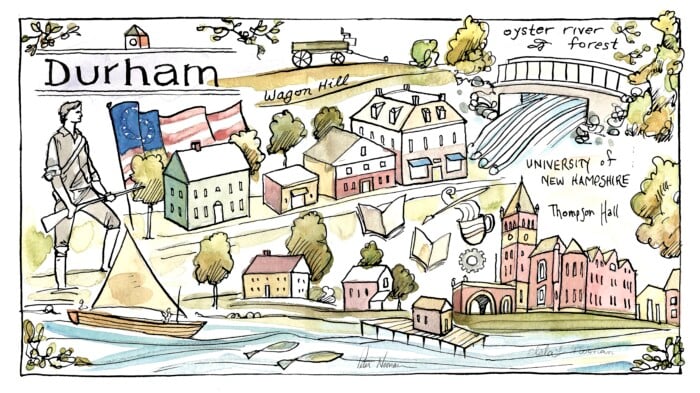Watch Her Pull Words from the Ether
Masheri Chappelle, chairwoman of NH Writers’ Project, is where she’s needed.
Expectations are curious things. Before meeting Masheri Chappelle, I anticipated she might be a no-frills straight-shooter: modest, rigid and inaccessible. I first learned of the chairwoman of the New Hampshire Writers’ Project while attending the New Hampshire Humanities 50th Anniversary Gala. She had a presence. How could I have lived in New Hampshire for seven years and never known she existed?
We met months later at Dancing Lion and shared tea and chocolates for hours. When Chappelle walked into the shop, the world stopped. She wore a caramel-colored ensemble. Perfectly paired rings and necklaces accentuated the gestures of her suit. Her purse was a weapon. Not because of how she moved with it — no, she was graceful in every regard — but because she could seemingly pull entire worlds from its depths.
Determined, intuitive and radiating positivity and encouragement, expectations were quickly shattered. As she sat across the table, the shine in her eyes told me I was in for a ride.
603 D: Let’s start from the impetus of the organization you chair. Why you are sitting at the helm of the New Hampshire Writers’ Project?
Chappelle: The Writer’s Project is a nurturing entity, one which provides experiences and opportunities to help individual writers evolve, grow and create.
We have many different resources for writers. We are not just an organization that hosts webinars and conferences, but we also provide resources to aid authors with their literary projects, information on the process of self-publishing and traditional publishing. Additionally, we provide education on the business aspects of writing, such as finding an editor, book cover design and pricing their published books.
603 D: These are incredible resources as you called them, but I feel like there is more that you are cultivating with your position as chairwoman.
Chappelle: The fact that we provide events and spaces for writers to be in the presence of other writers is crucial to the writing process and the writer’s journey. These needs have also been documented in surveys we conduct and send out to our members. Most members are looking for the opportunity to share conversations about writing. It is a soul’s journey to write, to tell a story. I am grateful to have a position and environment where I can use my intuitive abilities to guide writers through their stories; to help them reach what has been dormant for them, and in some cases, oppressed or forgotten.
603 D: What is the environment like when people walk into these spaces of shared learning or shared journey-taking?
Chappelle: Our Write-Ins are a journey of authenticity. Individuals who attend get a professional story guide or writing coach session with me. When writers attend our 603 Conference workshops, they engage with experienced professionals. We take the necessary steps to ensure our presenters can facilitate and engage members and attendees, impart information that elevates the participants’ writing skills, and hopefully offer the writer a deeper understanding of themselves. This invokes a more intentional experience. Our goal is to always provide a safe and nurturing space for writers to grow.
603 D: How often do these workshops take place? Where do they happen?
Chappelle: We offer many types of literary events that take place at different venues, like Saint Anslem, SNHU, Puritan Backroom, and the Exeter Inn. We offer monthly Write-Ins, which are designed to assist 15 writers. Each writer receives a 20-minute session with the professional story guide or writing coach in attendance. We also have the Biannual NH Literary Awards, an annual 603 Writers’ Conference (scheduled for June 14 this year: nhwritersproject.org), Masterclasses, Writers’ Night Out across the state; Literary Salons at the beautiful Exeter Inn; Fiction Slams, Stage Write Workshops, where the first chapter of a manuscript in progress is read by an actor in front of a live audience. Additionally, we offer monthly Writers’ Critique Groups, and recently we have partnered with The John Hay Estate at The Fells to produce a fall writing festival in Sunapee.
603 D: What do you believe is the need for all these unique and invigorating opportunities?
Chappelle: This is what writers in New Hampshire have always wanted. Spaces to remove emotional blocking. Spaces to open their creativity and help them find their voice.
603 D: These certainly sound like very effective efforts, which you and the NH Writers’ Project have created. I want to turn now to you, the artist, the writer, the culture keeper and storyteller. Do you present as various versions of yourself in different spaces, or do you use a different voice when you write for journals, blogs, books?
Chappelle: I do not have different faces or different Masheris. I do scare people sometimes, but I believe if individuals show up to the spaces I cultivate with a need to fulfill only themselves instead of working to uplift their communities of writers, they often find themselves walking right through the other door.
603 D: Can you speak on your own history and how it frames your approach to the work at hand?
Chappelle: I believe that my personal history is good for a reason. My history helps me to set clear boundaries and declarations as to what will be tolerated. I have an organization and a legacy to create and grow for this state. These spaces are for the community; to grow writers and talent we have right here. I am dedicated to this work.
My history … well, I learned Spanish because I lived in a bilingual community in the Bronx. I married into the Jewish community. I learned the importance of inclusion and of meeting new experiences with great anticipation and gratitude.
In my early years, I was in a College Bound Program at Benjamin Franklin High School. From there, I took a test and was chosen to attend a school in Guilford, Connecticut, through the ABC, A Better Chance Program. I was the first graduate of the Guilford ABC, which was incorporated in 1974.
This program afforded academically gifted girls, from inner city schools, the opportunity to attend a high-quality school which has a preparatory college-track program. I was one of seven girls of color at the time.
I met my first writing mentor and teacher, Mrs Fucci, who inspired me to write children’s short stories. I was very fortunate and blessed to have had the ABC experience. I consider myself having led quite the charmed life. When you have experiences like this, it uplifts you with confidence and feeds your creative abilities.
603 D: Your book, “The Oracle Files: Escape,” is an incredible story about a psychic phenomenon connecting characters across space and time. It speaks of the colorism often used to pin Black Americans against each other. But I am curious how you found your footing in writing the character Malachi, who is from Africa, and then projecting to Elizabeth Chase’s character, a Black woman so pale she uses her light-skinned privilege, Blue Veins, in navigating a world fraught with inhuman oppression.
Chappelle: For Malachai, I went back to the 1500s when the Portuguese and the Spaniards were coming over. I don’t want to tell you the ending. But Malachai has his world and his rules. These rules governed his life and his perception. And they govern what he takes from the physical world and brings into the spiritual world. He has one version of his reality, which he is unable to let go of. He sees the soul of Elizabeth and who she was in his life, and that’s why he chases her.
603 D: There is metaphor behind everything we do.
Chappelle: For me, it’s about the essence and the pain of humanity and how it is melded. And how the trajectory will continue if we do not recognize who we are. Malachi comes across as a dark character, but as the book evolves, you can see things he abides by because he was holding a truth and an honor that was the core of his existence. I take the roots of African Americans here and juxtapose it to Malachi. I think about the hierarchy of color; thinking back on my own personal discomfort. I remember the moment when I was 33 and pregnant with my second daughter. I was in the kitchen with my oldest daughter and my mother called her sister, Teresa, high yellow. The venom of her words shattered me.
603 D: I have to ask.
Chappelle: High Yellows, Redbones, Blue Veins — all the painful names we use to refer to light-skinned Blacks. This is why “The Oracle Files” was created. Throughout my entire life, race was never brought into the house or made an issue. My father was from Raleigh, North Carolina, a highly racist region. My grandfather was a Pullman, who handled passengers’ luggage on trains. My cousin found his name on the roster. So, I guess I never heard any racism, all the way through college. The racism I experienced was from my own people and about how I should not engage or befriend white people. I felt this language was so derisive. That the language was so angry. It wasn’t until I arrived in college that I experienced a bit of racism, when other Black students tried to get me to isolate myself from the college community. Had I adopted those divisive beliefs and sentiments, I would have excluded myself from many opportunities. I would have missed the opportunity to attend Guilford ABC, Smith College, and the opportunity to become a Smith Scholar. I’m not saying racism didn’t exist. I’m saying there is a more productive way to battle it.
I love who I am. I love being the little Black girl from the South Bronx, who became bilingual and had Puerto Rican friends. I love the rhythm of my words. I love the way that I, as a Black woman, can take a noun and turn it into an adjective when I get angry. There are many things that I am proud of about myself and things that are unique to me because of my experiences in both the physical and spiritual realms. I embrace them all.
603 D: May I ask for a few morsels to take with me and let the readers sit with after such an incredible interview?
Chappelle: Wherever you don’t see yourself is where you need to be. And, possibly, never allow anyone’s limitations to be yours.
This article was featured in 603 Diversity.
603 Diversity’s mission is to educate readers of all backgrounds about the exciting accomplishments and cultural contributions of the state’s diverse communities, as well as the challenges faced and support needed by those communities to continue to grow and thrive in the Granite State.


